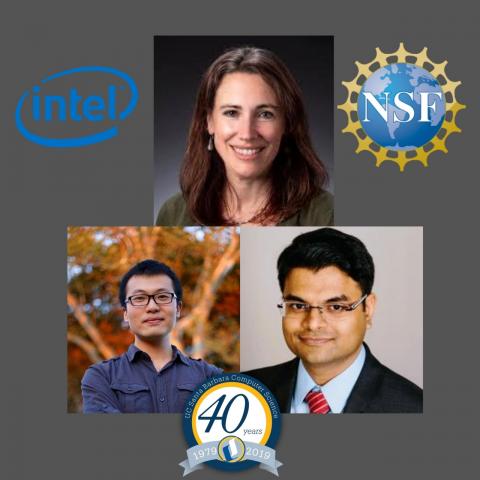Computer Science Faculty Received Future Wireless Systems Research Award from Intel and NSF

The University of California Santa Barbara has been awarded research funding into the development of future wireless systems as part of the Machine Learning for Wireless Networking Systems program (MLWiNS). This program, run by Intel and the National Science Foundation, supports research that accelerates innovation, focusing on enabling new wireless architectures that meet the density, throughput, and latency requirements of future computing applications.
Th UCSB team, led by computer science professors Arpit Gupta, Elizabeth Belding, and Yu-Xiang Wang, will be developing a wireless network management system that leverages reinforcement learning to optimize the quality of experience (QoE) for end-users. More concretely, this project will explore a data-driven approach to enhance QoE in wireless networks. The effort is focused on gathering data from real-world networks at scale, create new reinforcement learning-based algorithms for QoE enhancements, and a platform for algorithm deployment.
"The wireless networks of the future need to support much higher requirements than what current wireless networks can deliver, and they also need to be secure and energy-efficient," said Margaret Martonosi, assistant director for Computer and Information Science and Engineering. "That is why NSF and Intel have contributed $9 million to advance research activities addressing some of the most challenging issues in the development of future wireless systems."
“The project provides an excellent opportunity to explore how reinforcement learning can help develop the networks of the future, ones that can run with minimal human intervention,” says Gupta. Arpit Gupta joined the department in 2019. He co-directs the Systems and Networking Lab (SNL) that focuses on problems in systems and networking that intersect with machine learning and privacy.
Elizabeth Belding has been a faculty member in the computer science department since 2000. She is an ACM, AAAS, and IEEE Fellow and received the ACM SIGCOMM Test of Time Award in 2018. She directs the MOMENT lab that focuses on mobile and wireless networking.
Yu-Xiang Wang is the Eugene Aas Chair Assistant Professor in CS at UCSB since 2018. He runs the Scalable Statistical Machine Learning (S2ML) Lab and co-directs the Center for Responsible Machine Learning at UCSB. His research interests revolve around the intersection of machine learning, statistics, and optimization with a special focus on reinforcement learning, differential privacy, and deep learning.
More information about the program can be found here. Here is a link to Intel’s announcement and related fact sheet, A full list of award winners and project descriptions can be found here.